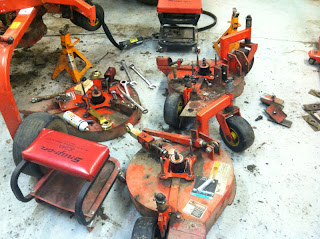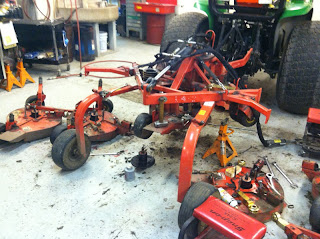As for the 3-man crew that remains, the objectives in the winter are as follows:
1. Do EVERYTHING possible to make sure we minimize mid-season breakdowns. This involves a surprising 'tear down and re-build' of just about every machine that we own. Generally speaking, we will remove wear parts such as bearings, seals, bushings and switches and replace them as needed to ensure no issues in the heat of the summer. Depending on the age of the equipment and how bad of a beating it takes, winter service ranges from simple tasks such as oil changes to more involved projects such as splitting tractors in half to repair transmissions. Also, we will grind, true, and sharpen every single piece of metal that cuts grass. Fortunately, here at Highland Meadows we have one of the best equipment managers in the area who can do just about anything in-house when it comes to turf equipment. He will guide the other 2 staff members through an in-depth preventative maintenance program that has paid very tangible dividends to our operation. Since Arthur took over the equipment in 2005, we have experienced fewer breakdowns, better cutting unit performance, fewer hydraulic leaks and several very old pieces of equipment still manage to perform well despite being past their useful life. This translates to more consistent conditions, less mowing during play, more efficient use of seasonal labor, more time between costly equipment replacement and obviously less dead grass from hydraulic oil or fuel leaks. Also, during tear-down we can identify and repair problems as we see them in winter instead of having crucial equipment disabled during the golf season. While not the most fun or exciting work, the winter equipment service saves a lot of headaches and money.
 |
| Rough-cutting units have a great deal of moving wear parts. They are completely disassembled and re-built as needed each season to keep your ball playable in the rough. |
 |
| You may be used to seeing the unit intact, so here we are tore down to the frame. The cutting units are then tore down to just parts to inspect and repair anything required. |
 |
| Gear boxes and pulleys removed for service. |
 |
| A batch of walk-behind greens mowers with the engines removed in preparation for service and grinding. |
 |
| Cowlings and engines are being removed to clean, grease, and re-seal all drive chains. Once complete, it will be off to the grinders for a good sharpening. |
2. Re-finish all course accessories. Once the equipment service is near completion, we will begin to address course accessories. Tee markers, ball washers, hazard stakes, bunker rakes, benches, cooler houses, yellow rope stakes and just about anything else you see on the course that is man-made is removed from the course, sanded or sand blasted, and refinished. It's bad enough we have to have all that stuff out there to clutter up the landscape, but it's worse if they all look ugly or in disrepair.
3. Plow snow - as snow may fall this season, your maintenance staff handles the parking lot and maintenance road plowing.
4. Shop/Facility improvements - Our facility is very out-dated, undersized, and just plain old. Each winter we make a series of improvements or repairs to keep in functional and as safe as possible for each year.
5. Project/Tree work - If the weather and budget allow, we may step out of the shop for a little project now and again.
6. Continuing Education - All of us that remain on staff are credentialed professionals in one way or another. Maintaining our state pesticide licenses and professional accreditation is very important for our careers. Also, with new developments in research, techniques, and technology we need to stay abreast of everything going on to best serve HMGC and the community. We do this by attending education conferences and trade shows throughout the region.
7. Planning - Reflecting on the previous season and finding ways to improve also takes up a lot of winter. If we aren't improving, then you should probably fire us all. The staffing, fertilizing, pesticide, and financial planning all happen this time of year for the upcoming season.
As you can see, we manage to stay pretty darn busy even with the snow on the ground. Along with all of that, we are still working on digging a well to look for an alternative irrigation water source. More on that soon. STAY TUNED!!
